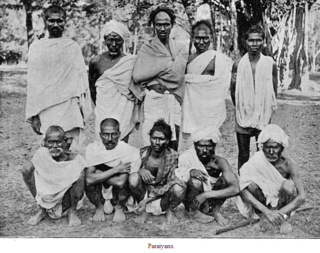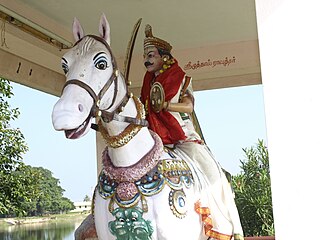Devakottai is a first-grade municipality in the state of Tamil Nadu, India. Located in the Sivaganga district, the town is situated close to the Karaikudi, near Rameswaram National Highway Road (NH-210). It is one of the major cities comes under the Chettinad area with rich heritage of houses built with limestone called "Karai Veedu". This Region is one of the towns in Chettinad belt. The town is famous for its ancient temple Sri Meenakshi Sundareswarar temple also known as Nagara Sivan Kovil.

Tamil Muslims are Tamils who practise Islam. The community is 6 million in India, primarily in the state of Tamil Nadu where 70% of the Muslim community identified themselves as Tamils. In Tamil Nadu, the majority of Tamil-speaking Muslims belong to the Rowthers Community while other Muslims live in coastal Tamil Nadu. However, the majority of these individuals are native Tamils who converted influenced by Tajuddin Cheraman Perumal. There is a substantial diaspora, particularly in Southeast Asia, which has seen their presence as early as the 13th century. In the late 20th century, the diaspora expanded to Western Europe, Persian Gulf and North America. These Tamil speaking Muslim communities in Sri Lanka were known as the Sonakar, which is derived from the term Yona, originally meaning a Moors.
Denotified Tribes are the tribes in India that were listed originally under the Criminal Tribes Act of 1871, as Criminal Tribes and "addicted to the systematic commission of non-bailable offences." Once a tribe became "notified" as criminal, all its members were required to register with the local magistrate, failing which they would be charged with a crime under the Indian Penal Code.

Irula, also known as Iruliga, are a Dravidian ethnic group inhabiting the Indian states of Tamil Nadu, Kerala and Karnataka. A scheduled tribe, their population in this region is estimated at around 200,000 people. People of Irula ethnicity are called Irular, and speak Irula, which belongs to the Dravidian languages family.
Vellalar is a group of castes in the Indian states of Tamil Nadu, Kerala and northeastern parts of Sri Lanka. The Vellalar are members of several endogamous castes such as the numerically strong Arunattu Vellalar, Chozhia Vellalar, Karkarthar Vellalar, Kongu Vellalar, Thuluva Vellalar and Sri Lankan Vellalar.

Paraiyar, or Parayar or Maraiyar, is a caste group found in the Indian states of Tamil Nadu and Kerala and in Sri Lanka.
Kongu Vellalar is a community found in the Kongu region of Tamil Nadu, India.
The Pallar, who prefer to be called Mallar, are an agricultural community from the Indian state of Tamil Nadu. The Pallars traditionally inhabited the fertile wetland area referred to as Marutham in the literary devices of the Sangam landscape. Today, they are the dominant Dalit community of southern Tamil Nadu and have developed a reputation for being assertive about their rights. Due to the demand of the pallar community to classify them under a more dignified generic name Devendrakula Velalar, recently they together with six other related castes have been given the name Devendrakula Velalar; however their original caste name remains valid and they are still part of the Scheduled Caste list.
The Mukkulathor people, who are also collectively known as Thevar, are a community or group of communities native to the central and southern districts of Tamil Nadu, India. They comprise the Agamudayar, Kallar and Maravar communities that share a common myth of origin and claim to have once been members of various ancient South Indian dynasties.

The Narikkuṟava are an indigenous group from the Indian state of Tamil Nadu.
Politics of Tamil Nadu is the politics related to the Indian state of Tamil Nadu.

The Boya is a disparate Indian community found in the South Indian states of Karnataka, Andhra Pradesh and Tamil Nadu. They are traditionally considered as "huntsmen caste", who ruled several regions and had served the ruling powers as administrators, raiders and had other martial pursuits.

The Rowther are originally a Tamil community from the Indian state of Tamil Nadu and Kerala. they were converted to Islam by the preacher Nathar Shah. Even after conversion they retained their caste name. they were elite cavalrymen of the Chola and Pandya kingdoms. They were traditionally a martial clan like the Maravars, and constitute large part of the multi-ethnic Tamil Muslim community. Rowthers have also been found as Tamil polygars, zamindars and chieftains from the 16th to 18th centuries. The traditional homelands of the Rowthers were in the interior of Southern Tamilakam.

Tamil nationalism is the ideology which asserts that the Tamil people constitute a nation and promotes the cultural unity of Tamil people. Tamil nationalism is primarily a secular nationalism, that focus on language and homeland. It expresses itself in the form of linguistic purism, nationalism and irredentism, Social equality and Tamil Renaissance.

The Tamil Nadu Legislative Assembly is the unicameral legislature of the Indian state of Tamil Nadu. It has a strength of 234 members, all of whom are democratically elected using the first-past-the-post system. The presiding officer of the Assembly is the Speaker. The term of the Assembly is five years, unless dissolved earlier.
Satani is a community that renders temple services in the states of Andhra Pradesh, Karnataka, Tamil Nadu and Telangana in India. Traditionally, they have rendered a variety of services as supervisors and purohits of minor temples, guardians of temple properties, heralds, singers and torch-bearers at festivals, bodyguards of Jiyars, and providers of umbrellas, flower garlands, and namam clay. They have claimed Brahmin status, although this has been contested by Brahmins as they do not wear the sacred thread and they do not study or chant/recite Sanskrit Vedas or Gayatri Mantra, but they study and recite only Naalayira Divya Prabandham written by Alvars. They are currently included in the Other Backward Classes (OBC) list by the central and state governments.
The Kuravar is an ethnic Tamil community native to the Kurinji mountain region of TamilNadu and Kerala, India.
The Panar are a community found mainly in various districts of Karnataka including Kundapura Taluk and Udupi District, India.
Kulala is a Hindu caste who traditionally pursued pottery trade and farming as professions and are commonly found in the Indian states of Andhra Pradesh, Karnataka, Kerala, and southern and western parts of Tamil Nadu. They belong to the Other Backward Class group.